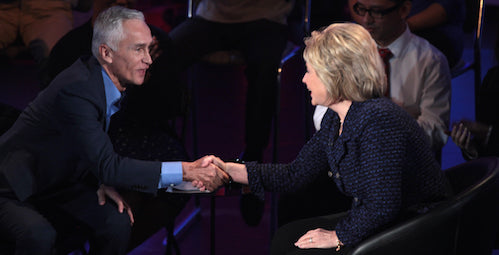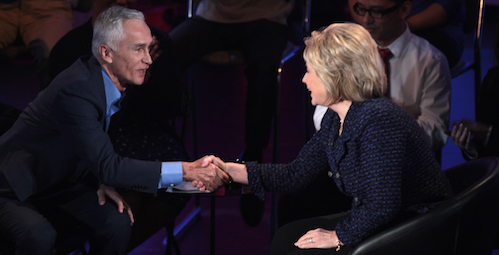Spanish-language and Latino Media and the US Election: How The News is Sold to Indignation Nation


The 2016 Presidential campaign has been a very significant one for Latinxs, often referred to as the “sleeping giant” of the electorate. While Republican candidate Donald Trump astonished most media observers with his set of shifting, unorthodox political positions, it’s been his crudely racist and sexist discourse that have become the campaign’s central focus. Yet his relentless attacks demonizing immigrants from Mexico and Central America and conflating them with the national security issues represented by border enforcement--represented by his dubious wall-building dream--have put our interests in a narrowly defined box, obscuring discussion of other issues critical for Latinxs.
The role of media in driving the way issues are represented is a bit more complex when discussing Latinxs, who have varying degrees of language preference. While the vast majority of Latinxs in the US gradually become English-dominant by the 3rd generation in this country, Spanish-language media is strongly influential on recent and first-generation immigrants, as well as their acculturating children. Even for those of us who prefer English, Spanish-language media has often been an important resource that reflects the US Latinx perspective, as well as highlight stories that are not prioritized in the major English-language media.
Due to the fragmentation of media-viewing habits among mainstream Americans, and Latinxs’ greater dependence on traditional media, the Spanish-language network Univision often ranks ahead of mainstream networks or is #1 on particular nights or time slots, and as a result it has become a driver of not only Spanish-language news coverage, but a major player in corporate media, owning millennial-focused properties like Fusion, The Root, and Gawker Media. As Univision has come to dominate media that targets Latinxs, it also seems to be setting the standard for the rest of the Latinx-focused media, particularly the way it imbues a synthesized monolithic Latinx identity with both political and consumer marketing techniques.
The general strategy used by Univision was perhaps revealed as early as July of last year in an John Podesta email recently disclosed by Wikileaks. “Haim thinks we are underreacting to Trump/Hispanics,” wrote the Clinton campaign chairman. “Thinks we can get something by standing up for Latinos or attacking R’s (Republicans) for not condemning.” Haim, of course, is Haim Saban, the Chairman and part owner of Univision, the U.S.’s largest Spanish-language network and who with his wife has also donated over $27 million in the past 20 years to either Hillary Clinton’s campaigns, the Clinton Foundation, or Priorities USA, a pro-Clinton super-PAC.
Haim, who has dual Israeli and US citizenship, led a group of investors that bought Univision in 2006 from Jerrold Perenchio, a US-born non-Latinx, and has parlayed his position to attempt to influence US foreign policy, particularly toward Israel, taking a somewhat hard line against states like Iran, for example. Although he claims not to interfere with Univision’s news departments, the leaked email from Podesta seems to indicate that at least on the surface, the content of Univision’s coverage of the Presidential race does not deviate from his observation that focusing on Trump’s attack on Mexican immigrants is a powerful galvanizer of Latinx political power. He would also presumably aware that such indignation also acts as a massive engine to drive ratings for his network, just as the backlash against Obama helped boost Fox News’s ratings in recent years.
Recent coverage of the campaign on Univision has centered, by and large around this indignation. This week, the network has promoted stories about Trump’s efforts to discourage voting by people of color; ex-Congressman Joe Walsh’s threat to grab his “musket” if Trump lost the election; how residents of Trump Tower in Manhattan are embarrassed to say so; the awkward moment when Trump wondered why ABC anchor George Stephanopolous was not on a New York Times list of those he had insulted. NBC-owned Telemundo, Univision’s main competitor, ran stories about Trump’s negative comments towards women, how to react if you are intimidated at the polls, Trump’s refusal to accept the election results, how Salma Hayek rejected Trump’s advances, and Trump’s poor performance at the Al Smith Dinner.
Media owned by Latin American interests takes a somewhat different tone, emphasizing some concrete issues, as well as Latin American viewpoint. Aztec America, owned by Televisa, a major Mexican network, ran a story about California Proposition 58, which would bring back bilingual education to public schools, as well as a letter sent by Mexican government leaders to Hillary Clinton. They also focused on a story that appeared prominently in La Opinion, one of a chain of newspapers owned by Argentina’s La Nación newspaper conglomerate. Written by Pilar Marrero, the story criticizes both Clinton and Trump for having vague and poorly detailed plans to address immigration reform, noting that Clinton has not explained why Obama’s policies have accounted for the 40% of undocumented immigrants deported between 2008 and 2015 who had not been convicted of a crime.
It’s important to note that Latinx media activists like Angelo Falcón of the National Institute for Latino Policy have criticized the takeover of newspapers like L.A.’s La Opinión and New York’s El Diario/La Prensa for eroding local reporting, cutting staff, and creating websites that are often mirror images of each other. Yet media that either originates in Latin America or is owned by Latin American interests (CNN en Español, for example) tends to have more perceptive coverage of either US Latinx issues or how the election may affect US policy toward Latin America. The recently inaugurated New York Times en Español site, based in Mexico City, however, despite Mexican billionaire Carlos Slim’s majority stake in New York Times Co., featured a fact-checking initiative by Univision News that proved Trump lied more than Hillary; a story about Hillary resisting Trump’s intransigence during debates, and a story about the Trump “bad hombre” meme that came out of the last debate.
The loosely affiliated nexus of US Latinx reporters and sites that focus on Latinx issues don’t deviate much from the Univision model either. Buzzfeed, Huffington Post Latino Voices, Latino USA and NBC Latino devote most of their space on election coverage to the importance of the Latino vote, often voiced by Voto Latino’s María Teresa Kumar or TV star America Ferrara, how Latinos can be the difference in capturing swing state Florida for Clinton, and Hillary’s love for hot sauce. The Rupert Murdoch-owned Fox News Latino, whose site is in both English and Spanish and diverges considerably from Fox News proper, reflects the growing ambivalence of its parent company’s inner turmoil while actually integrating more Latin American stories with US election coverage.
The Univision-led backlash against Trump is rooted in his long and considerable track record of racist pronouncements, but it has been exacerbated by his refusal to engage with or have a presence in Spanish-language media. While it can be said that Haim has long had a pro-Clinton agenda, Trump’s disdain for Mexicans, Mexico, and even the Spanish language itself makes it much less likely that Spanish-language or Latinx focused coverage will give him the benefit of the doubt that it might give to someone like Mitt Romney or John McCain. Clinton’s choice of Tim Kaine, who is fluent in Spanish, seems increasingly astute, since his mere ability to communicate to an indignant constituency of Latinxs partially blunts concerns that he is “not progressive enough.”
An unfortunate byproduct Trump’s over-the-top intransigence is the overshadowing of issues not related to identity politics. Even his imputations of ineptitude and even criminality on the part of Hillary Clinton seems tinged by an anti-woman bias. The unavoidable “Trump effect” he has created more discussions about shaming and bullying than wages and education.
As someone whose work has been largely energized, informed, and in many ways defined by anti- racist and sexist identity politics, I am not trying to diminish the crucial importance of defending against hatred of women, people of color, and sexual minorities. There should be many works like Jorge Ramos’s short video for Fusion about the rise of hate groups in America, encouraged not only by Trump but the racism stoked by Obama’s presidency in general, which is as sobering as the rest of the reporting on that issue.
Yet Ramos’s recent body of work, on Univision, in Spanish, and Fusion, in English, has been defined by his dramatic confrontation with Trump at a press conference in 2015, his Sunday “Al Punto” talk show, is dominated by further denunciations of the obvious target, with his denunciations of authoritarianism expanding to critiques of Venezuela and Mexico’s leaders. Last year’s New Yorker profile of Ramos had him assuring readers that his daughter’s working for the Clinton campaign did not affect his judgement and proclaiming the mantra of demography is destiny when it came to Latinx interests finally getting their day in 21st century America.
Ramos, like Univision and much of the media that serve Spanish- and English-speaking Latinxs, have become purveyors of a moral high ground and prophets of a rapidly increasing consumer buying power that we are projected to have. This perspective seems drawn from the convergence between media and marketing that coalesced at the dawn of “Hispanic” media in the 1980s. In an attempt to unite the disparate interests of Mexican-Americans, Cuban-Americans, and Puerto Rican citizen-migrants, while deflecting negative stereotypes pervasive in Hollywood, they created an identity that had certain “values.” Those were adherence to family, tradition, and spirituality that would create a consumer target to be exploited by marketers, whose message that Latinxs are hardworking entrepreneurs-in-the-making has become tightly interwoven with the journalistic content produced by the new Hispanic media.
It remains to be seen whether discussion of serious immigration reform, the real result of free-trade policies on wages and jobs, wealth inequality, residential segregation, mass incarceration, educational and employment opportunity, all issues that affect US Latinxs, will return to prominence once the Trump menace is defeated. If so, then the Spanish-language media should be compelled to cover them with renewed intensity and dedication. U.S. foreign policy toward Latin America, another of Clinton’s questionable involvements that is almost never discussed, might have a chance to come into prominence as well. But right now, US Latinxs have to deal with the reality that most of the media they’re getting, whether it’s in Spanish or English, is being produced by companies that are not owned by Latinxs or Latin Americans, is designed to reinforce brand loyalty, and that for the most part fails to inform them in ways that are similar to, if not worse than their mainstream counterparts.
Ed Morales is an author and journalist who has written for The Nation, The New York Times, Rolling Stone, the Village Voice, and the Guardian, among many others. He is the author of Living in Spanglish (St. Martins) and The Latin Beat (Da Capo Press), and a forthcoming book about Latinxs and race for Verso. He is currently a lecturer at Columbia University’s Center for the Study of Ethnicity and Race, and a fellow of a new working group studying the Puerto Rico debt crisis at the Center for the Study of Social Difference.
